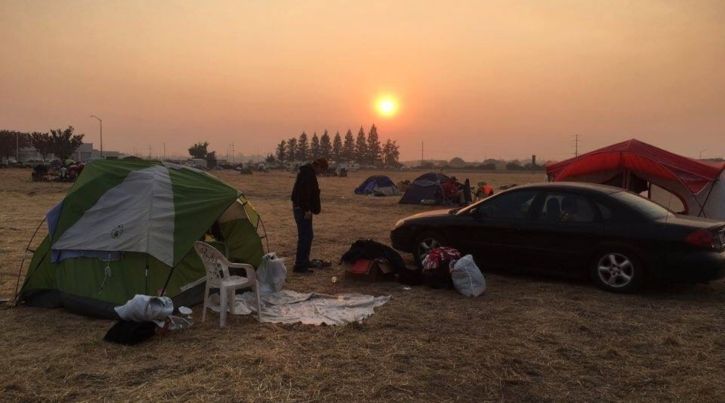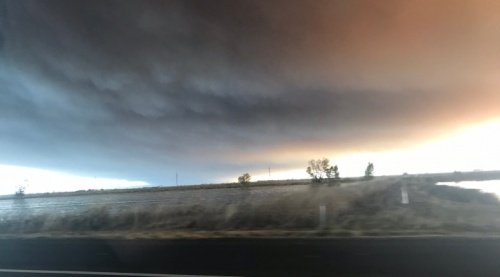Responding to the Wildfires in California

Web Statement
Providing Ongoing Response to the California Wildfires
November 19, 2018
Episcopal Relief & Development is partnering with the Episcopal Diocese of Northern California to provide emergency support for those impacted by deadly wildfires in California. The assistance includes food, gasoline, masks and other critical supplies, as well as emergency housing and the storage of belongings.
Wildfires broke out earlier this month in both Northern and Southern California, scorching over 248,000 acres, destroying almost 14,000 structures and killing 80 people to date, a number which is expected to rise. Over 900 people remain missing as of Monday morning. Virtually the entire town of Paradise, CA was destroyed by the Camp Fire, leaving thousands without homes to return to. Air quality remains poor in northern California, but has improved somewhat over the weekend.
The Episcopal Diocese of Northern California has established a core disaster response team in Chico, CA, west of Paradise, to assess and respond to emergency needs of people who have been impacted by the fires. The diocese is working to provide emergency housing and shelter, food, masks, gasoline, and other basic supplies to those in need. The team is also arranging for storage of recovered belongings in short-term storage units.
“The diocesan leaders have worked to create relationships that allowed them to take action swiftly in this crisis,” said Lura Steele, Program Officer, Resilience, US Disaster Programs at Episcopal Relief & Development. “Our partners will continue to assess and respond to the needs of people impacted by the fires in the weeks to come.”
Please continue to pray for the individuals and families affected by the California wildfires as well as the firefighters and first-responders. Donations to the US Disaster Fund will help those affected by the devastating wildfires.
For over 75 years, Episcopal Relief & Development has been working together with supporters and partners for lasting change around the world. Each year the organization facilitates healthier, more fulfilling lives for more than 3 million people struggling with hunger, poverty, disaster and disease. Inspired by Jesus’ words in Matthew 25, Episcopal Relief & Development leverages the expertise and resources of Anglican and other partners to deliver measurable and sustainable change in three signature program areas: Women, Children and Climate.
Episcopal Relief & Development staff member Lura Steele captured the smoke from the fires Saturday afternoon when she was in Northern California to give a presentation at their diocesan convention.
Web Statement
Responding to the Wildfires in California
November 15, 2018
Episcopal Relief & Development is partnering with the Episcopal Diocese of Los Angeles and the Episcopal Diocese of Northern California as they coordinate with local congregations to provide emergency support to those impacted by the wildfires in Northern and Southern California. The US Disaster Team is in daily communication with the dioceses through coordination calls to organize response efforts.
Wildfires have scorched more than 240,000 acres in Northern and Southern California, displacing more than 300,000 residents, including 170,000 in the Los Angeles area and causing 66 deaths as of Friday afternoon. Over 600 people are still reported missing. The Camp Fire in Northern California has destroyed over 9,700 homes, including the entire town of Paradise, CA making it the most destructive wildfire in California’s history to date. In Southern California, the Woolsey Fire has burned more than 98,000 acres and destroyed at least 500 structures to date.
The Episcopal Diocese of Northern California has established a core disaster response team based in Chico, CA, approximately 12 miles west of Paradise, to assess damage and determine how to best support recovery efforts. St. Nicholas Episcopal Church and Paradise Lutheran Church both remain intact, however, as the fire is not yet fully contained, many have been unable to return to their homes and are sheltering in place. Air quality remains poor due to the smoke. Teams have already begun to distribute emergency supplies such as masks, clothing, food, gas and other basic needs.
The dioceses are holding daily coordination calls with bishops, local clergy and key diocesan disaster leaders including the Rev. Canon Michael Bamberger, a member of the Episcopal Relief & Development Partners in Response and Resilience team and retired Battalion Chief with the Sierra Madre Volunteer Fire Department. The dioceses are also paying close attention to pastoral needs and the impact to vulnerable communities.
“Assessment is ongoing as the fires are not fully contained yet,” said Lura Steele, Program Officer, Resilience, US Disaster Programs at Episcopal Relief & Development. “We will continue to work with our local partners to respond to the needs of those affected.”
Please continue to pray for the individuals and families affected by the California wildfires as well as the firefighters and first-responders. Donations to the US Disaster Fund will help those affected by the devastating wildfires.
|
Prayer in a Time of Disaster Loving and Compassionate God, you are our comfort and strength in times of sudden disaster, crisis or chaos. Surround us now, O Lord, with your grace and peace. Through storm or winds, fires or floods. By your Spirit, lift up those who have fallen, Sustain those who work to rescue or rebuild, And fill us with the hope of your new creation; Through Christ, our rock and redeemer. Amen. |
For over 75 years, Episcopal Relief & Development has been working together with supporters and partners for lasting change around the world. Each year the organization facilitates healthier, more fulfilling lives for more than 3 million people struggling with hunger, poverty, disaster and disease. Inspired by Jesus’ words in Matthew 25, Episcopal Relief & Development leverages the expertise and resources of Anglican and other partners to deliver measurable and sustainable change in three signature program areas: Women, Children and Climate.



